By JOHN HOWELL
The excitement was high and the dogs barking made it all the more palpable.
Karin Muller pulled open the door and in an instant the larger of the two – a German shepherd …
This item is available in full to subscribers.
We have recently launched a new and improved website. To continue reading, you will need to either log into your subscriber account, or purchase a new subscription.
If you are a current print subscriber, you can set up a free website account by clicking here.
Otherwise, click here to view your options for subscribing.
Please log in to continue |
|
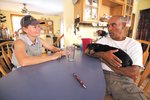
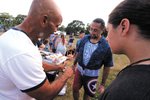
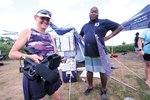
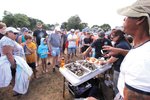
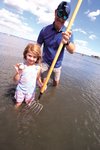
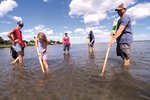
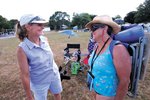
The excitement was high and the dogs barking made it all the more palpable.
Karin Muller pulled open the door and in an instant the larger of the two – a German shepherd – ran into the adjoining kitchen, leading the way. The Dachshund, on the other hand, wasn’t as welcoming. He stood his ground and kept sounding the alarm.
Muller took no notice. These weren’t her dogs. In fact, this wasn’t her home, but quite obviously she felt at home.
“Car-in,” she said extending her hand and making sure to use the proper pronunciation of her name. She was born in Switzerland.
Being accepted is nothing extraordinary for Muller. The veteran National Geographic filmmaker has traveled to remote corners of the world to document a side of Our Human Planet, the PBS documentary she directs, that few outsiders have ever seen, according to her LinkedIn profile.
“Karin travels without a camera crew, learns the local language, and lives for months at a time with Andean farmers and Arab Revolutionaries, Bedouin nomads and Mongolian wrestlers,” reads the description.”
Karin works alone and makes a point to learning a language before implanting herself in a foreign country. She speaks six languages.
But what was she doing in the Oakland Beach home of Jody King a week ago Sunday?
Sunday was the second day on the King shoot for her series of Unsung Heroes. Last week, she accompanied King quahogging and sailing, filmed a second Rhode Island unsung hero – Saad Awad who is working for the non-profit Beautiful Day, traveled to Vermont to do groundwork to film another segment and returned to Rhode Island to catch King instruct more than 50 people in quahogging at North Kingstown beach. Somewhere within this self-imposed hectic schedule she’ll find time, as she put it, “head for the mountains” and solitude where she would spend a week editing in her camper.
A week ago Monday, Muller was prepared for a full day documenting King.
“He’s so dense; he’s doing everything; he’s nonstop,” she said.
While she craves action to tell the story, it’s not always the case. Occasionally there are long spells for something to happen such as the man she was filming who volunteers to save injured animals. She was forewarned King had a busy day and she was up for it. He shucked little necks for a party in Narragansett. They would visit the Station Fire Memorial in West Warwick, the site of the nightclub fire that killed Jody’s brother, Tracy, and 99 others. Before the memorial was built, King spearheaded the effort to build a memorial to the 10 Warwick residents who lost their lives in the fire. She saw that, too.
Connecting with heroes
Later in the week she connected with Awad, a Syrian refugee who came to this country in 2005. Now naturalized, Awad went on to own two restaurants. Forced to close during the pandemic, he felt “a little burned out” and questioned what he might do to help others. He responded to an ad. Beautiful Day that assists refugees to adjust to life in this country was looking for staff. With his background and experience, Beautiful Day signed up Awad.
Muller was looking to do a segment on someone working with refugees. She contacted an agency in Florida and they in turn suggested she reach out to Beautiful Day. Awad was approached. He doesn’t think of himself as a hero, but thought if his story could help others and Beautiful Day, he would do it.
Awad said he immediately bonded with Muller. “It felt like we were best friends when I first met her,” he said. He didn’t know what he was getting into, but after interviews and filming, he concludes it, “was the greatest three days of my life.”
On the other hand, King was nominated for the series by Kim Sullivan at the Department of Environmental Management who he has worked closely with for the last ten years on the DEM program “Come Clam with Me.” Sullivan said King came to mind when she saw one of Muller’s Unsung Heroes stories on YouTube.
“He’s super passionate about the Bay, a huge advocate for safety and the environment,” she said Sunday as the DEM and the Veterans Center co-sponsored the North Kingstown Beach event that concluded with King cooking up his father’s recipe for steamed quahogs served with bread and natural broth.
“That’s Narragansett Bay water, it’s that fresh,” King said as his students, who all went home with quahogs, gathered around for bowls of quahogs and the spicy brew. Muller put the camera aside and grounded the drone she used for aerial shots to do some quahogging as well as participate in shucking little necks to be eaten fresh from the shell.
Her goal is to visit the 48 contiguous states to document, “ordinary Americans who are building and bettering community.” She initiated the project three years ago and started filming in California where she lives. The pandemic put a crimp in things, but she’s on the road and filming. On Sunday, Muller didn’t have time to relate some, or for that matter, any of her adventures over the last 20 years traveling alone to tell stories from different cultures and areas of conflict. Wikipedia offered some insight.
Stories from around the world
She has published three books (Hitchhiking Vietnam, Along the Inca road, and Japanland), produced numerous international television documentary series, and is a frequent lecturer for the National Geographic Society and universities throughout the United States.
Her first expedition took her to the Ho Chi Minh Trail in Vietnam, which enabled her to produce a PBS television special, Hitchhiking Vietnam, and a companion book by Globe Pequot Press of the same name. This was followed by the Inca Road, a 4,000-mile trek from Quito, Ecuador to Santiago, Chile resulting in a 3-part television series, Along the Inca Road for National Geographic and a book published by the Adventure Press. She focused on Japan where she completed a 1,300 kilometer pilgrimage and produced a 4-hour documentary series and book. In 2013, PBS released her documentary Cuba’s Secret Side. More recently she did documentaries in Chad and the Sudan. In the Sudan she explored the refugee camps, embedded with rebels and government soldiers, and filmed stories of nomadic goat herders and sultan's wedding ceremonies.
She has been threatened and, according to what she told King, came close to dying after being struck on the head during an encounter between rebel African forces. Her sight was affected and realizing what she needed to do, she crawled to hide under bushes for three days allowing for the swelling of her brain to subside before a treacherous evacuation where she hid her equipment in a welded steel drum buried is a shipment of grain. Meanwhile, adopted by the locals, she posed as one of them on a bus ride to safety.
Wikipedia reports that in February 2013, PBS released Muller's documentary, Cuba's Secret Side. Part one, titled Under the Radar, looks at the results of the 1959 Communist Cuban revolution by examining the day-to-day life of a variety of Cuban citizens.
Part two of Cuba's Secret Side is titled The Truth Revealed. It delves into Cuba's unique religious combination of Catholicism and Santería. This part of the documentary also looks at spear fisherman and their homemade fishing tackle. The second part of the series ends with the examination of a large town festival; light displays, fireworks and a float parade inspire both competition and cooperation in the local citizens.
“Filmed over the course of three months, and without the supervision or permission of the Cuban government, Muller was detained by Cuban authorities over 12 times. The resulting documentary strives to be even-handed, documenting both the successes and failures of the Cuban government. Most remarkably, it details a Cuban humanitarian crisis that happened in the early 1990s only 90 miles from the shores of the United States,” reads the report.
Unique to Rhode Island
It’s unlikely Muller will encounter such tribulations documenting Unsung Heroes in this country.
She says she’s found stories and people in this country like nowhere else.
Take 86-year old Alton Thacker who lives in Salt Lake City Utah who has survived two heart attacks and five stokes. Thacker started and oversees Tiny Tim’s Toy Factory that has manufactured more than a million toys, which he is now giving to non-profits. He gave Muller, who has formed her own non-profit, Take 2: The Student's Point of View whose mission is to help students develop global citizenship and leadership skills, 100 wooden toy cars which she has been giving away on her shots.
Muller’s experience in Utah also put her on course to sharing her work immediately rather than waiting for PBS to feature it in a couple of years if at all. She didn’t want to wait to tell Thacker’s story and started showing episodes on YouTube.
What set Muller on her mission to tell the stories of people across this country was a conference that featured members of a Russian band the government banned and came down hard on for their takeoff on Putin. She remembers a member of the audience questioning how band members would respond to how political differences have divided this country. She anticipated they would recommend standing up for what they believe right and marching in the streets. Instead the message was to personally build a better community.
“The only way to fix this (the division we see in this country) is to go out in the community,” she said.
Muller confides she even considered bypassing Rhode Island because it is so small. She’s glad she didn’t for not only has she made friends, but she has found that the state’s smallness connects Rhode Islanders and builds community.
She saw it when King took her sailing with Jack Early on the Monday night race on Greenwich Bay. She was amazed by the diversity of the crew, their ages, their professions and political leanings and how welcomed she was as crew and for the dinner that followed.
“If we (the whole country) could be like Rhode Island we could solve our problems.”
Comments
No comments on this item Please log in to comment by clicking here